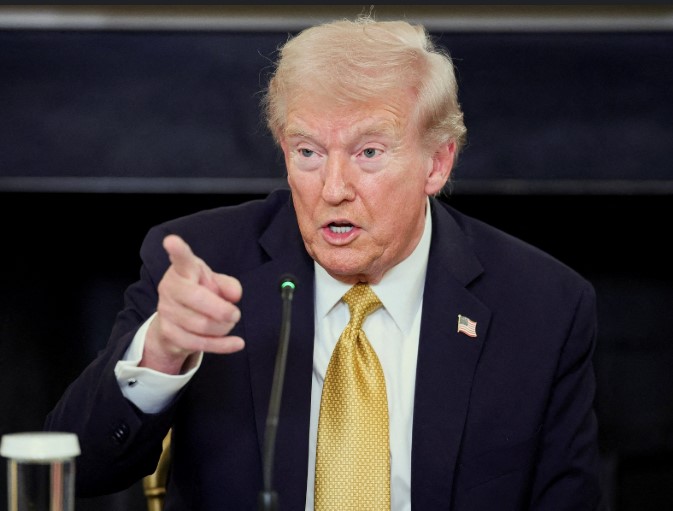U.S. President Donald Trump has said that his administration does not need a formal declaration of war to act against drug cartels. Speaking at the White House on Thursday, Trump explained that operations against drug cartels would continue both at sea and soon on land. His remarks came as the U.S. military expanded its presence across the Caribbean with more ships, aircraft, and troops to stop illegal drug movement toward American shores.
Rising U.S. Military Action Against Drug Cartels
Trump stated, “We’re not going to ask for a declaration of war. We’re just going to kill people that are bringing drugs into our country.” His words reflected a tough stance against drug cartels, which he has often blamed for fueling crime and addiction across the United States.
In recent weeks, the U.S. has stepped up its anti-drug missions in the Caribbean and the Pacific Ocean. The operations include the use of guided-missile destroyers, nuclear submarines, and advanced F-35 fighter jets. The U.S. has deployed thousands of troops as part of this intensified mission. These actions show that Washington is heavily focusing on intercepting shipments that drug cartels manage before they reach American soil.
Maduro’s ties to terrorist organizations and drug cartels spark record $50 million reward from U.S
The Pentagon confirmed that U.S. forces have carried out several military strikes against suspected drug cartels since early September, killing nearly 40 people in these missions. While officials have shared limited details, they confirmed that some of the operations targeted vessels operating near Venezuelan waters.
Trump’s Focus Shifts to Land Operations Against Drug Cartels
During his address, Trump hinted that the fight against drug cartels would soon move from the sea to land. “Now they are coming in by land. The land is going to be next,” he said. This comment suggests that the U.S. is preparing to expand its anti-drug operations beyond the maritime zone and possibly closer to cartel-controlled regions.
According to reports, the United States has already conducted several maritime strikes, including one that drew attention last week. Two suspected traffickers reportedly survived a U.S. military strike in the Caribbean. After being rescued, they were taken to a U.S. Navy warship before being returned to their home countries — Colombia and Ecuador.
Trump’s strong comments indicate that the administration is treating drug cartels as a national security threat rather than just a criminal issue. The growing use of military resources — including aircraft, naval ships, and elite forces — points to a strategy that closely resembles wartime operations.
However, Trump made it clear that he does not plan to seek Congress’s approval for a declaration of war. Under U.S. law, the president can order limited military operations without congressional authorization, as long as it does not involve long-term combat or occupation. His statement has drawn attention because it reflects the administration’s willingness to take independent and forceful action against drug cartels operating near U.S. borders.
Regional Reactions and Military Justifications
The U.S. campaign against drug cartels has also raised tensions with some Latin American countries. Venezuela’s President Nicolás Maduro issued a warning during a televised speech in Caracas. He said that if the United States ever intervened in Venezuelan territory, it would trigger a nationwide uprising. “The working class would rise and a general strike would be declared in the streets until power is regained,” Maduro said. He added that “millions of men and women with rifles would march across the country.”
The U.S. Department of Defense, however, defended its actions, describing them as necessary to curb trafficking by drug cartels. Sitting beside Trump at the White House event, U.S. Defense Secretary Pete Hegseth explained the handling of captured traffickers. He said that the U.S. military repatriated the two survivors of a recent strike according to military norms followed during past conflicts.
“In those conflicts, we captured thousands on the battlefield and handed over 99% to host-nation authorities,” Hegseth said. “Did we always like the outcome? Not always. But it was the standard, and it’s the same here.”
Massive 50,000 Kg Chemical Bust at U.S. Border Exposes Chinese Link to Deadly Mexican Drug Cartels
The Pentagon’s involvement in anti-drug operations reflects a larger policy shift in how the U.S. views transnational drug cartels. The U.S. now treats them as military-level threats. They can destabilize regions and harm American citizens through the illegal narcotics trade.
The U.S. has heavily deployed advanced weapon systems such as F-35 stealth jets and nuclear-powered submarines. This deployment underlines the seriousness of the campaign. Military analysts believe the large number of U.S. assets involved shows strong determination to stop shipments linked to drug cartels before they reach North America.
These operations continue alongside Trump’s firm words. Together, they show that the U.S. aims to keep pressure on drug cartels through steady and decisive military actions.

